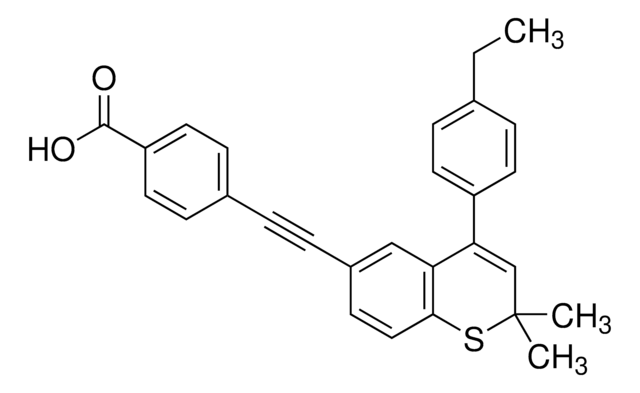SML3881
AK-2292
≥98% (HPLC)
Synonym(s):
((2-(((2S)-1-((2S)-2-((3-((5-(2-(2,6-Dioxopiperidin-3-yl)-1-oxoisoindolin-4-yl)pent-4-yn-1-yl)(methyl)amino)-3-oxopropyl)(4-(thiazol-2-yl)phenyl)carbamoyl)pyrrolidin-1-yl)-3,3-dimethyl-1-oxobutan-2-yl)carbamoyl)benzo[b]thiophen-5-yl)difluoromethyl)phosphonic acid
About This Item
Recommended Products
Quality Level
Assay
≥98% (HPLC)
form
powder
color
white to beige
solubility
DMSO: 2 mg/mL, clear
storage temp.
-10 to -25°C
Biochem/physiol Actions
AK-2292 is a cell penetrant, potent and highly selective PROTAC degrader of STAT5A (signal transducer and activator of transcription 5 A) and STAT5B isoforms. AK-2292 potently induces degradation of STAT5 in normal mouse tissues and human chronic myeloid leukemia (CML) xenografts in mice. It potently inhibits the growth of acute myeloid leukemia (AML) cell lines.
Storage Class Code
11 - Combustible Solids
WGK
WGK 3
Flash Point(F)
Not applicable
Flash Point(C)
Not applicable
Certificates of Analysis (COA)
Search for Certificates of Analysis (COA) by entering the products Lot/Batch Number. Lot and Batch Numbers can be found on a product’s label following the words ‘Lot’ or ‘Batch’.
Already Own This Product?
Find documentation for the products that you have recently purchased in the Document Library.
Our team of scientists has experience in all areas of research including Life Science, Material Science, Chemical Synthesis, Chromatography, Analytical and many others.
Contact Technical Service







